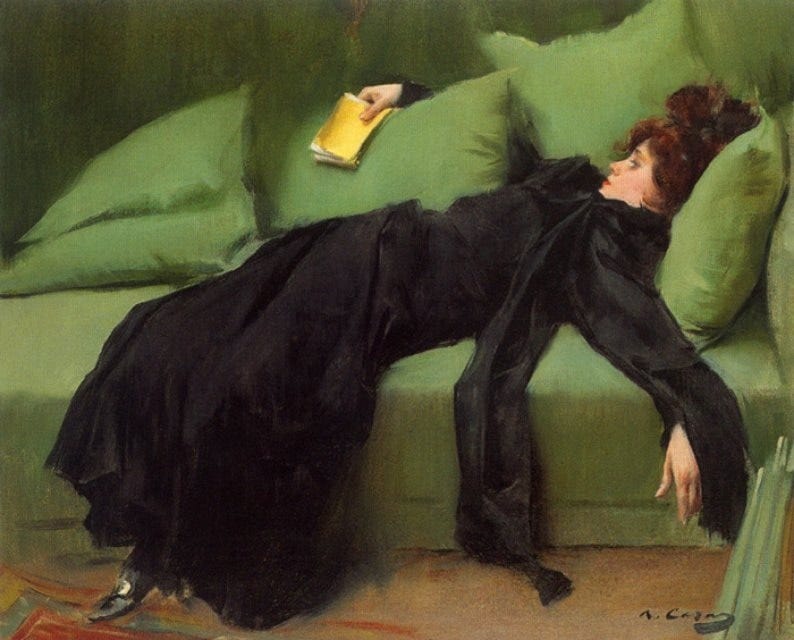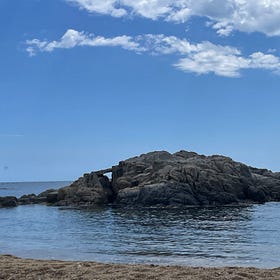the rise of retreat culture™
on rest, self-care and the comfortably rich
‘Caring for myself is not self-indulgence, it is self-preservation, and that is an act of political warfare’ - Audre Lorde
Recently I’ve been inundated with invitations to go on restorative, healing retreats. Would I like to spend a week ‘nurturing my own love and my own sense of belonging’, they ask? Yes please. How about ‘celebrating community, laughter, movement and delicious plant power meals’? That sounds great, I think, before I click on the invite and discover that nurturing my own love comes with a hefty price tag, often an ‘investment’ in the region of £1500-£2500.
The expense of these restorative breaks make me wonder what, exactly, those attending think they are participating in. Growing up I understood retreats not as an opportunity to unwind in a Greek villa, but as time spent away from the routines of ordinary life to contemplate our spiritual health. The couple I attended were not showy, and often located in pretty basic accommodation. They also didn’t tend to make big promises about the food or how great you will feel at the end. Perhaps the isolation offered you more time for prayer, or maybe you just sat there bored out of your mind for a week.
In contrast, each time a new invite for a ‘retreat-experience’ appears in my feed, I can’t help but feel that these are glorified holidays intended only for a wealthy minority. Intentionally or not, the spiritually-infused language of ‘retreat’ (derived from the Latin retrahere, meaning to ‘pull back’) is used to market these wellness trips to those who a) feel burnt out and b) can afford it.
Many of these retreats also try to commodify a sense of ‘community’ whilst failing to recognise that the communities they are fostering are antithetical to the mutual flourishing of society as a whole. In this respect, describing these activities as ‘retreats’ feels deeply appropriate, for they are a way for those who can afford it to withdraw from the reality of our society in total comfort, without the riff-raff.
Self-care, once posited as a radical act of resistance by Audre Lorde, has now metamorphosed into a series of multi-billion dollar industries. In 2022 the Global Wellness Institute stated that the Wellness Tourism sector (of which retreats form a part) had an economic value of $651billion. By 2027 the rapidly growing sector is predicted to be worth $1.4trillion(!). In a lecture given to the 2016 Global Wellness Summit, Andreas Braun described the current state of the wellness industry as creating ‘ghettos of elite wellness’, whereby the ‘winners of our society’ have access to luxurious resort destinations, whilst everyone else must settle for fitness centres maintained by the social system. (Braun is Austrian, so perhaps unaware that government-funded gyms are not the norm.)
There seem to be a couple of things happening at once here. On the one hand, we have a rapidly growing industry which seems to perpetuate structural inequalities whilst professing to care about the wellbeing of individuals. Simultaneously, this industry seems to be co-opting religious language in order to imbue their product with spiritual credentials.
The West’s focus on the individual as the locus of spiritual and economic activity is something I’ve written about before. It’s the idea (found in both Greek and Christian philosophy) that individuals are responsible for their own salvation, and so attentiveness to self-improvement takes on a noble, religious dimension. But as Elizabeth Oldfield argues in her new book ‘Fully Alive’, the West’s modern fixation with self has come at the cost of community: ‘Today’s plural secular, Western societies have gifted us many things, but reliable sources of communal meaning isn’t one of them’. It seems that some of us are so unfamiliar with what genuine community looks like (messy! hard work! often infuriating but ultimately pretty great!) that we believe we can simply add it on to our lives as part of a retreat package.
I do not subscribe to any spiritual or religious philosophy which requires an extortionate entrance fee, or which perpetuates so many of the inequalities which we should be trying to dismantle. As opportunities for rest and retreat become increasingly commodified and debased from their spiritual and historical origins, it seems as if we’re entering a dystopian era of self-care in which those who are most in need of radical rest are the ones facilitating it for the privileged few.
Does this have to be the case though? In an effort to reclaim self-care from capitalist forces, Tricia Hersey, founder of The Nap Ministry, began experimenting with rest as a tool for her own liberation and healing in 2013.
I took to rest and naps and slowing down as a way to save my life, resist the systems telling me to do more and most importantly as a remembrance to my Ancestors who had their DreamSpace stolen from them. This is about more than naps. It is not about fluffy pillows, expensive sheets, silk sleep masks or any other external, frivolous, consumerist gimmick. It is about a deep unraveling from white supremacy and capitalism.
I am in awe of Hersey, whose work offers a lifeline to people living in deeply precarious situations. At the moment, the best the retreat industry seems to offer is the occasional sliding scale payment model on an individual basis - but it strikes me that any retreat company professing to care about social-justice needs to embrace a far more radical, redistributive approach, which gives back equitably to the communal traditions and societies it profits from.
Criticising the retreat industry in this way can seem a bit bah humbug. Why shouldn’t people have time away from their hectic lives in order to get a bit of balance back? In principle, I don’t have a problem with that, but let’s call it for what it is: a fancy holiday! I love a fancy holiday. What I do have a problem with is the dressing up of luxury experiences as something inherently connected to our spiritual and communal flourishing- let’s call a spade a spade.
I’ve been reading:
Jessica DeFino’s newsletter The Review of Beauty, which brilliantly unravels the connections between wellness culture and the beauty industry. Her piece on Sofia Coppola’s collab with Augustus Bader was great, even if it made me sad.
Elizabeth Oldfield’s new book Fully Alive, which is out now!
You might have missed:
God is not who you think she is
People, be they religious or spiritual, atheist or agnostic, seem to have some pretty firm ideas about who God is. Here are a few that might sound familiar: 1) God is an angry man who controls our lives. 2) God is the figment of an over-active imagination.
Golden Hour #040: a holiday of errors
Hello Golden People, and greetings from the very last remnants of my trip to Spain. I started writing this sat on the floor of an airport in Barcelona, where we’ve spent the past week ‘on holiday’. I put the last bit in quote marks because a friend once said that after you have children holidays stop being holidays for a while, and instead become a cras…
Thank you for reading. The Murmuration is a biweekly newsletter written by Grace Pengelly. Its existence is reliant on paid subscribers, so if you enjoyed reading please consider upgrading your subscription or forwarding this email on to a friend. Thank you.





Great read, Grace. I'm very new to running retreats, and the first two I'm doing (in Wales and Tuscany - chefs kiss) are expensive but absolutely brimming with things that cost a lot to make happen. But I am *very* aware that they aren't affordable to most- and have plans in place to make sure it's way more accessible next time. It's front of mind. You make good points here -- it is a glorified holiday with like-minded peeps. which isn't actually a bad thing in essence - but that's what it is!
The "investment" language gives me pyramid-scheme vibes. Every time I see the cost of one of these my jaw drops!